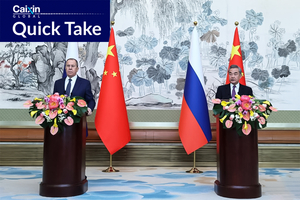Xi and Putin Agree to Further Deepen Economic and Military Ties During State Visit
Listen to the full version

President Xi Jinping joined his Russian counterpart Vladimir Putin in Beijing on Thursday, in a high-profile meeting at which the two countries announced a further deepening of ties.
China and Russia will promote an “all-round development” of their “comprehensive strategic partnership of coordination for a new era,” by maintaining close high-level and civilian exchanges while seeking new channels of cooperation, according to a joint statement released by Chinese state media.

Unlock exclusive discounts with a Caixin group subscription — ideal for teams and organizations.
Subscribe to both Caixin Global and The Wall Street Journal — for the price of one.
- DIGEST HUB
- Xi Jinping and Vladimir Putin met in Beijing to deepen China-Russia strategic ties, enhancing high-level exchanges, military collaboration, and economic cooperation.
- Both leaders called for an end to confrontational policies and exclusive blocs, criticizing U.S. strategies, and advocated for peace negotiations in the Ukraine conflict.
- Putin's visit, his first international trip since re-election, focused on various cooperative sectors, including multilateral platforms and global governance, with multiple high-level Russian officials in attendance.
President Xi Jinping and Russian President Vladimir Putin met in Beijing, announcing a closer partnership between their countries. They aim to enhance their "comprehensive strategic partnership of coordination for a new era" through high-level and civilian exchanges and developing new cooperation channels [para. 1][para. 2]. Additionally, military collaborations will be expanded, focusing on joint exercises and training to improve their ability to address risks and challenges together [para. 3]. The countries will also deepen economic ties by increasing investment, reinforcing energy collaboration, and boosting the use of local currencies in trade and financing [para. 4].
Amid global tensions, Xi and Putin criticized confrontational policies and regional conflicts, pointing at the U.S.'s "small yard, high fence" strategy, which restricts certain technologies while maintaining economic relations. They condemned the formation of exclusive alliances in Asia and the Pacific, especially against third parties, criticizing the U.S.'s Indo-Pacific Strategy and some NATO efforts [para. 5][para. 6]. On the Ukraine crisis, both leaders emphasized halting actions that escalate the conflict and welcomed Beijing's constructive role in seeking a diplomatic resolution [para. 7].
Putin's visit to China is his first overseas trip since his recent election for a fifth term. He has visited China nearly two dozen times and met Xi on 40 occasions. During their meeting at the Great Hall of the People, they addressed each other affectionately, with Putin calling Xi "my dear friend" and Xi referring to Putin as "my old friend" [para. 8][para. 9]. Xi urged stronger communication in multilateral platforms like the United Nations, BRICS, and the Shanghai Cooperation Organization (SCO) to promote a fair global governance system. China will chair the SCO this year, while Russia will host the 2024 BRICS Summit, during which both nations will support each other's roles and strengthen ties with the global South [para. 10][para. 11].
Putin expressed his willingness to work closely with Beijing on strategic cooperation and promote the multipolarization of the world. He noted that their cooperation is a stabilizing factor in international affairs and is not directed against third parties [para. 12]. Putin's delegation includes six deputy prime ministers and other high-profile officials, who will discuss various topics including trade, economic cooperation, and humanitarian affairs with their Chinese counterparts [para. 13][para. 14]. Defense Minister Andrei Belousov, Sergey Shoigu, foreign minister, central bank governor, finance minister, and heads of several state corporations are also part of the delegation [para. 15]. Putin will also meet Chinese Premier Li Qiang and attend the opening ceremony of the Russia-China Expo in Harbin [para. 16]. A concert was held to commemorate the 75th anniversary of diplomatic relations between China and Russia [para. 17].
In an interview published by Xinhua News Agency, Putin stated that China and Russia's relations are at an all-time high, despite global challenges. He emphasized the importance of a peaceful and fair resolution to the Ukraine conflict, taking into account all involved countries' interests [para. 18][para. 19]. A Summit on Peace in Ukraine will be held in Switzerland in mid-June, but Russia has declined participation, although the Swiss government noted that a peace process without Russia is unthinkable [para. 20]. China supports a globally recognized peace conference for Ukraine, and since May 2023, has sent envoy Li Hui to Europe for mediation efforts. Putin praised China's approaches to resolving the conflict, including a 12-point peace proposal and four principles mentioned by Xi [para. 21][para. 22][para. 23][para. 24].
- PODCAST
- MOST POPULAR






